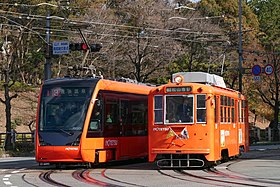Jōnan Line
| Jōnan Line | |
|---|---|
 A train near Minami-Horibata Station | |
| Overview | |
| Native name | 城南線 |
| Owner | Iyotetsu |
| Locale | Matsuyama, Ehime Prefecture |
| Termini | Dōgo Onsen, Nishi-Horibata, Heiwadōri 1-chōme (branch) |
| Stations | 11 |
| Website | http://www.iyotetsu.co.jp |
| Service | |
| Type | Light rail |
| History | |
| Opened | 11 September 1911 |
| Technical | |
| Line length | 3.5 km (main) 0.1 km (branch) |
| Track gauge | 1,067 mm (3 ft 6 in) |
| Electrification | Overhead line, DC 600 V |
The Jōnan Line (城南線, Jōnan-sen) is a light rail line owned by Iyotetsu. The line is composed of a main line between Dōgo Onsen and Nishi-Horibata and a branch line between Heiwadōri 1-chōme and Kamiichiman. The two lines runs entirely within the city of Matsuyama, Ehime Prefecture, Japan.
History
[edit]The Jōnan Line was built in 1911 by the Matsuyama Electric Railway (松山電気軌道), who ran electric trams on a 1,435 mm (4 ft 8+1⁄2 in) track.[1][2] The Matsuyama Electric Railway was merged with Iyotetsu in 1921, who continued to operate the line.[3] In 1923, the tracks were converted from 1435 mm to 1,067 mm (3 ft 6 in).[4]
Operations
[edit]The line is electrified with overhead lines. The main line is double-tracked, while the branch line is single-tracked. Five light rail services, along with the heritage railway train Botchan, run on the line.[5][6]
| Service | Route |
|---|---|
| 1 | Matsuyama City - JR Matsuyama - Kiyachō - Teppōcho - Ōkaido - Matsuyama City |
| 2 | Matsuyama City - Ōkaido - Teppōcho - Kiyachō - JR Matsuyama - Matsuyama City |
| 3 | Matsuyama City - Ōkaido - Dōgo Onsen |
| 5 | JR Matsuyama - Ōkaido - Dōgo Onsen |
| 6 | Matsuyama City - Honmachi 1-chōme - Honmachi 6-chōme |
Stations
[edit]![]() : Stations served by the heritage railway train Botchan[6]
: Stations served by the heritage railway train Botchan[6]
| Number | Name | Distance (km) | Services | Connections | ||||||
|---|---|---|---|---|---|---|---|---|---|---|
| 24 | Dōgo Onsen | 道後温泉 | - | 3 | 5 | Ōtemachi Line ( 1 2 ) | ||||
| 23 | Dōgo Park | 道後公園 | 0.3 | 3 | 5 | |||||
| 22 | Minamimachi | 南町 | 0.8 | 3 | 5 | |||||
| 16 | Kamiichiman | 上一万 | 1.2 | 1 | 2 | 3 | 5 | Branch line to Heiwadōri 1-chōme | ||
| 17 | Police Station | 警察署前 | 1.5 | 1 | 2 | 3 | 5 | |||
| 18 | Katsuyamachō | 勝山町 | 1.8 | 1 | 2 | 3 | 5 | |||
| 19 | Ōkaido | 大街道 | 2.2 | 1 | 2 | 3 | 5 | |||
| 20 | Ehime Prefectural Office | 県庁前 | 2.6 | 1 | 2 | 3 | 5 | |||
| 21 | Matsuyama City Hall | 市役所前 | 2.8 | 1 | 2 | 3 | 5 | |||
| 02 | Minami-Horibata | 南堀端 | 3.1 | 1 | 2 | 3 | 5 | 6 | Hanazono Line ( 1 2 3 6 ) | |
| 03/25 | Nishi-Horibata | 西堀端 | 3.5 | 1 | 2 | 5 | Honmachi Line ( 6 , via Honmachi 1-chōme) | |||
| Branch line | ||||||||||
| 16 | Kamiichiman | 上一万 | 1.2 | 1 | 2 | 3 | 5 | |||
| 15 | Heiwadōri 1-chōme | 平和通一丁目 | 1.3 | 1 | 2 | Jōhoku Line ( 1 2 ) | ||||
References
[edit]- ^ "三 伊予鉄道①". Ehime Prefectural Lifelong Learning Center (in Japanese). 31 March 1986. Retrieved 7 March 2020.
- ^ "松山電気軌道由来の主電動機。". 鉄道ホビダス (in Japanese). 30 May 2013. Retrieved 5 March 2020.
- ^ "いよてつ125年の歴史". Iyotetsu (in Japanese). Retrieved 4 March 2020.
- ^ "本町線 Hom-machi Line". 撮ってまわった日本と欧米 (in Japanese). Retrieved 6 March 2020.
- ^ "Tram Route Map" (PDF). Iyotetsu (in Japanese). Retrieved 5 March 2020.
- ^ a b "坊っちゃん列車に乗ろう! ご利用案内". Iyotetsu (in Japanese). Retrieved 5 March 2020.
